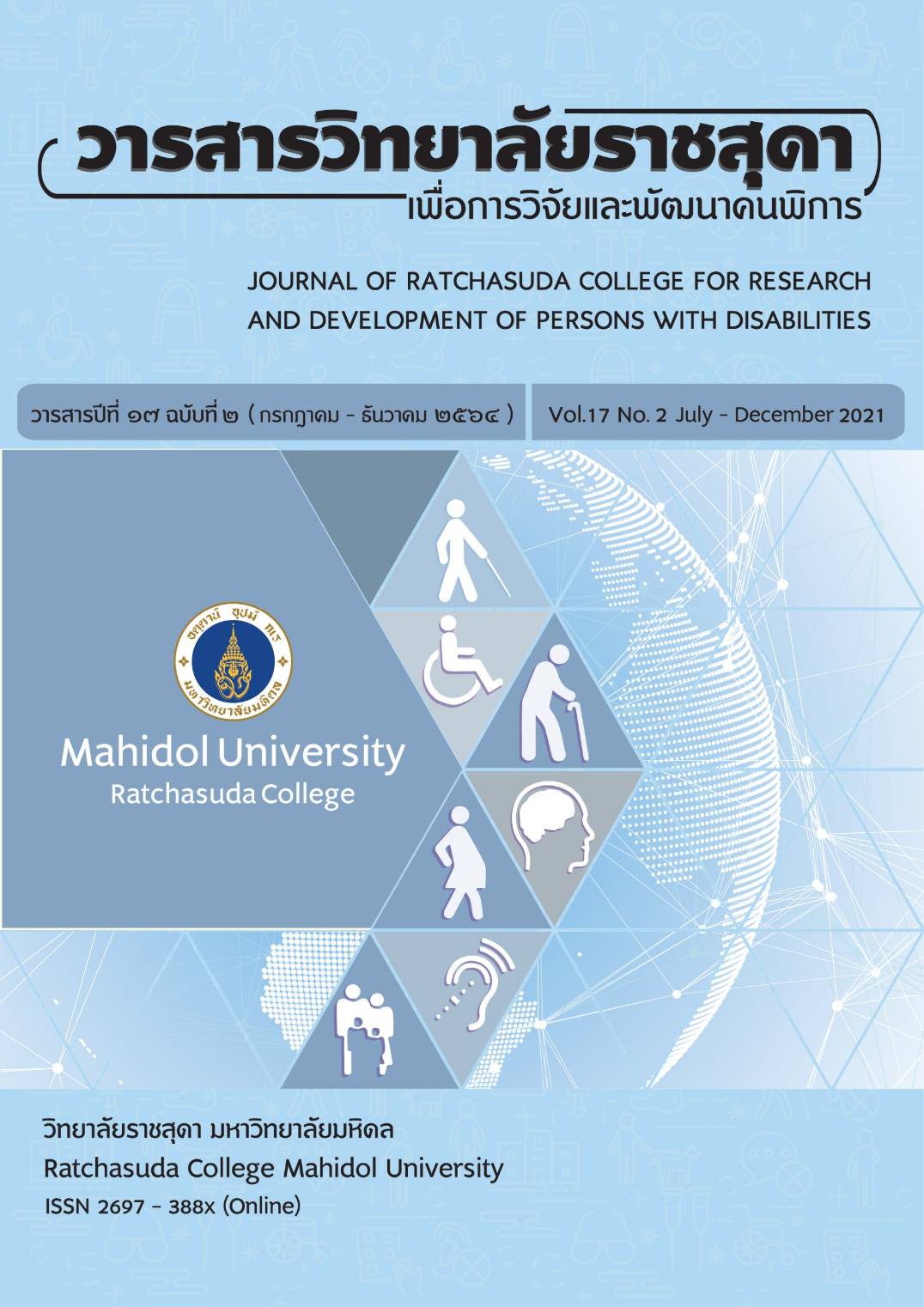การพัฒนาต้นแบบระบบส่งเสริมและพัฒนาผู้เรียนสำหรับโรงเรียนเรียนรวม
คำสำคัญ:
การส่งเสริมและพัฒนาผู้เรียน, การจัดการศึกษาแบบเรียนรวม, โรงเรียนเรียนรวมบทคัดย่อ
งานวิจัยครั้งนี้มุ่งเป้าหมายเพื่อพัฒนาต้นแบบระบบส่งเสริมและพัฒนาผู้เรียนสำหรับโรงเรียนเรียนรวม ใช้วิธีการดำเนินการวิจัยรูปแบบผสมผสานวิธี (mixed methodology) ประกอบด้วยระยะที่ 1 การพัฒนาชุดแนวทางการดำเนินงานระบบส่งเสริมและพัฒนาผู้เรียนสำหรับโรงเรียนเรียนรวมและนำไปทดลองในโรงเรียน 2 แห่ง และระยะที่ 2 คณะผู้วิจัยสังเคราะห์ข้อมูลจากระยะที่ 1 และนำไปวิพากษ์เพื่อให้ได้ข้อเสนอแนะ และปรับเป็นต้นแบบระบบส่งเสริมและพัฒนาผู้เรียนสำหรับโรงเรียนเรียนรวม ผลการวิจัยหลังจากนำชุดแนวทางการดำเนินงานระบบฯ ที่พัฒนาขึ้นไปทดลองในโรงเรียนพบว่ามีคะแนนความพร้อมและติดตามการเปลี่ยนแปลงของการจัดการศึกษาแบบเรียนรวมเพิ่มขึ้น นอกจากนี้ผลการจัดวิพากษ์ต้นแบบระบบ ส่งเสริมและพัฒนาผู้เรียนสำหรับโรงเรียนเรียนรวมที่ดี พบว่า ควรประกอบด้วยองค์ประกอบ 3 ส่วน ได้แก่ องค์ประกอบที่ 1 ตัวบ่งชี้ 6 ด้านของระบบฯ (inputs) คือ (1) การจัดการเรียนการสอน (2) การบริหารระบบทรัพยากรและข้อมูล (3) การดูแลช่วยเหลือและส่งเสริมศักยภาพ (4) การมีส่วนร่วมในโรงเรียนของผู้เรียน (5) การทำงานร่วมกันของผู้เกี่ยวข้อง และ (6) การพัฒนาครู องค์ประกอบที่ 2 กระบวนการการดำเนินงานช่วยเหลือหลายระดับตามแนวทาง Multi-Tier Systems of Support (process) ได้แก่ ระดับที่ 1 การส่งเสริมและพัฒนาผู้เรียนทั่วไป ระดับที่ 2 การส่งเสริมและพัฒนาผู้เรียนที่มีภาวะเสี่ยง และ ระดับที่ 3 การส่งเสริมและพัฒนาผู้เรียนที่มีความต้องการจำเป็นพิเศษ และองค์ประกอบที่ 3 ตัวบ่งชี้ความสำเร็จ 2 ด้าน (outputs) ได้แก่ (1) ผลที่เกิดกับผู้เรียน และ (2) ผลที่เกิดกับบุคลากรในโรงเรียน
Downloads
เอกสารอ้างอิง
Amornpaisarnloet, W. (2020). Translating national policies to school-wide practices. In Oxford Research Encyclopedia of Education. Umesh, S (ed). New York: Oxford University Press, forthcoming. Retrieved from https://doi.org/10.1093/acrefore/9780190264093.013.ORE_EDU-01206.R1
Barnes, A. C., & Harlacher, J. E. (2008). Clearing the confusion: Response-to-intervention as a set of principles. Education and Treatment of Children, 31(3), 417-431 Retrieved from https://www.jstor.org/stable/42899986
Burns, M. K., & Ysseldyke, J. E. (2009). Reported prevalence of evidence-based instructional practices in special education. The Journal of Special Education, 43(1), 3-11. Retrieved from https://doi.org/10.1177/0022466908315563
Cook, B. G., & Odom, S. L. (2013). Evidence-based practices and implementation science in special education. Exceptional Children, 79(2), 135-144. Retrieved from https://doi.org/10.1177/001440291307900201
Fixsen, D., Blase, K., Metz, A., & Van Dyke, M. (2013). Statewide implementation of evidence-based programs Exceptional children, 79(2), 213-230. Retrieved from https://doi.org/10.1177/001440291307900206
Fixsen, D. L., Blase, K. A., Naoom, S. F., & Wallace, F. (2009). Core implementation components. Research on social work practice, 19(5), 531-540. Retrieved from https://doi.org/10.1177/1049731509335549
Fletcher, J. M., Lyon, G. R., Fuchs, L. S., Barnes, M. A., Stuebing, K. K., Francis, D. J., Olson, R. K., Shaywitz, S. E., & Shaywitz, B. A. (2002). Classification of learning disabilities: An evidence-based evaluation. In R. Bradley, L. Danielson, & D. P. Hallahan (Eds.), Identification of learning disabilities: Research to practice (pp.185-250). Retrieved from https://doi.org/10.1002/pits.10181
Fletcher, J. M., & Vaughn, S. (2009). Response to intervention: Preventing and remediating academic difficulties. Child Development Perspectives, 3(1), 30–37. Retrieved from http://doi.org/10.1111/j.1750-8606.2008.00072.x
Gischlar, K. L., Keller-Margulis, M., & Faith, E. L. (2018). Ten Years of Response to Intervention: Trends in the School Psychology Literature. Contemporary School Psychology, 1-10. Retrieved from https://doi.org/10.1007/s40688-018-0179-9
Harlacher, J. E., Sakelaris, T. L., & Kattelman, N. M. (2014). Multi-tiered system of support. In Practitioner’s guide to curriculum-based evaluation in reading (pp. 23-45). Springer New York.
Horner, R. H., Kincaid, D., Sugai, G., Lewis, T., Eber, L., Barrett, S., Dickey, C. R., Richter, M., Sullivan, E., Boezio, C., Algozzine, B., Raynolds, H., & Algozzine, B. (2014). Scaling up school-wide positive behavioral interventions and supports: Experiences of seven states with documented success. Journal of Positive Behavior Interventions, 16(4), 197–208. Retrieved from https://doi.org/10.1177/1098300713503685
Kantavong, P., & Kiettikunwong, N. (2020). Different paths for inclusion in Thailand: improving special teachers as leaders in the development of inclusive education. Journal of Research in Special Educational Needs, 20(1), 74-84. Retrieved from https://doi.org/10.1111/1471-3802.12467
Kurth, J. A., Lyon, K. J., & Shogren, K. A. (2015). Supporting students with severe disabilities in inclusive schools: A descriptive account from schools implementing inclusive practices. Research and Practice for Persons with Severe Disabilities, 40(4), 261-274. Retrieved from https://doi.org/10.1177/1540796915594160
Loreman, T. (2014). Measuring inclusive education outcomes in Alberta, Canada. International Journal of Inclusive Education, 18(5), 459-483. Retrieved from https://doi.org/10.1080/13603116.2013.788223
Loreman, T., Forlin, C., & Sharma, U. (2014). Measuring indicators of inclusive education: A systematic review of the literature. Measuring inclusive education, 3, 165-187. Retrieved from https://doi.org/10.1108/S1479-363620140000003024
Pivik, J., Mccomas, J., & Laflamme, M. (2002). Barriers and facilitators to inclusive education. Exceptional Children, 69(1), 97-197. Retrieved from https://doi.org/10.1177/001440290206900107
Ruijs, N. M., Van der Veen, I., & Peetsma, T. T. (2010). Inclusive education and students without special educational needs. Educational Research, 52(4), 351-390. Retrieved from https://doi.org/10.1080/00131881.2010.524749
Sailor, W., McCart, A. B., & Choi, J. H. (2018). Reconceptualizing inclusive education through multi-tiered system of support. Inclusion, 6(1), 3-18. Retrieved from https://doi.org/10.1352/2326-6988-6.1.3
Special Education Bureau. (2017). Guidelines for assessing quality according to the inclusive learning standard to internal quality assurance of educational institutions. Bangkok : National Office Of Buddhism.
Sugai, G., & Horner, R.H. (2009). Responsiveness-to-Intervention and School-Wide Positive Behavior Supports: Integration of Multi-Tiered System approaches. Exceptionality, 17(4). 223-237. Retrieved from https://doi.org/10.1080/09362830903235375
Tantixalerm, C. (2014). Effects of Individualized Education Program and behavior on behavior in classroom of primary students with learning disabilities. Bangkok : Faculty of Education Chulalongkorn university.
Tantixalerm, C. (2017). Response to Intervention (RTI): Principles, core components, and practical implications for promoting inclusive education practices in Thailand. Journal of Research Methodology, 30(2). 127-171.
Thompson, A. M., & Cox, T. (2016). Multi-Tiered Systems of Support. School Social Work: National Perspectives on Practice in Schools, 133.
Wapling, L. (2016). Inclusive education and children with disabilities: Quality education for all in low and middle income countries. CBM, 3. Retrieved from https://www.cbm.org/fileadmin/user_upload/Publications/Quality_Education_for_All_LMIC_Evidence_Review_CBM_2016_Full_Report.pdf
UNESCO. (2000). Final report of World Education Forum, Dakar, Senegal, 26-28 April 2000. UNESCO. Retrieved from https://unesdoc.unesco.org/ark:/48223/p
ดาวน์โหลด
เผยแพร่แล้ว
รูปแบบการอ้างอิง
ฉบับ
ประเภทบทความ
สัญญาอนุญาต
ลิขสิทธิ์ (c) 2021 วารสารวิทยาลัยราชสุดา เพื่อการวิจัยและพัฒนาคนพิการ

อนุญาตภายใต้เงื่อนไข Creative Commons Attribution-NonCommercial-NoDerivatives 4.0 International License.
บทความที่ได้รับการตีพิมพ์เป็นลิขสิทธิ์ของวารสารสถาบันราชสุดาเพื่อการวิจัยและพัฒนาคนพิการ






